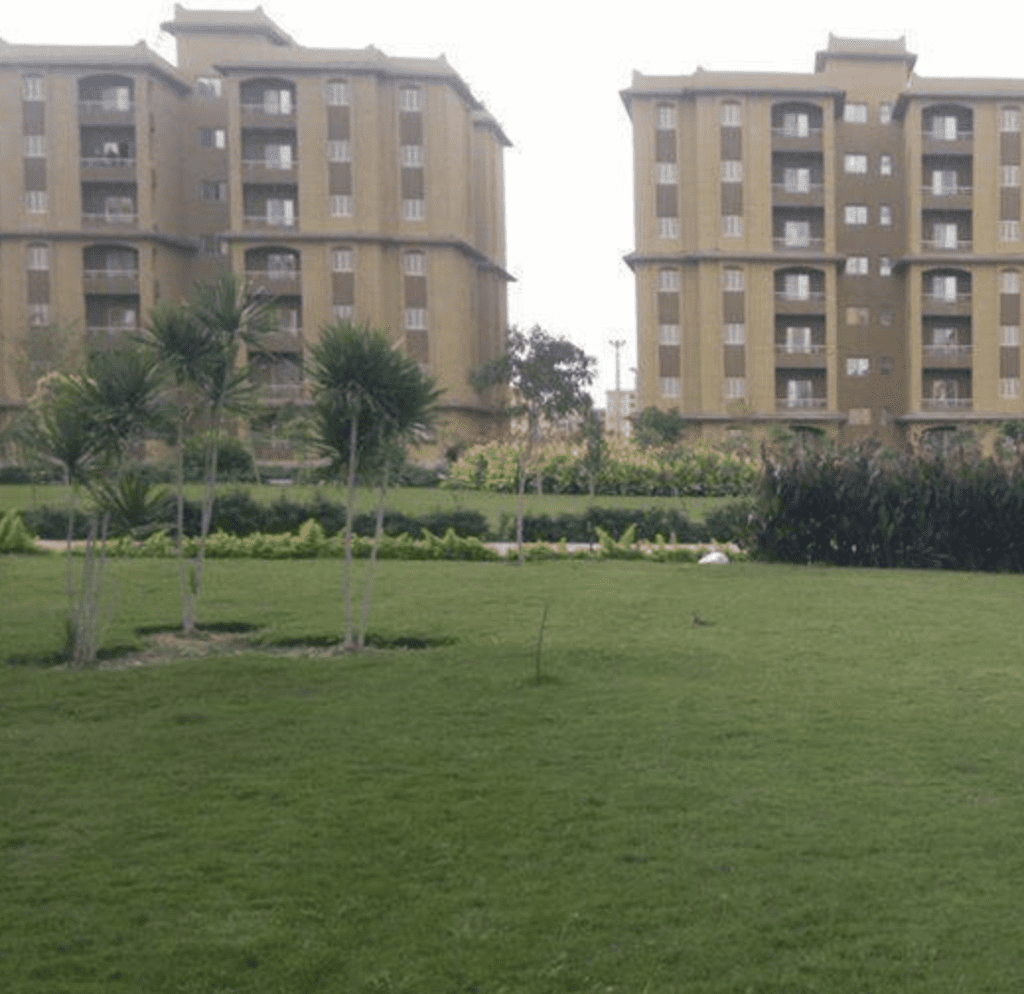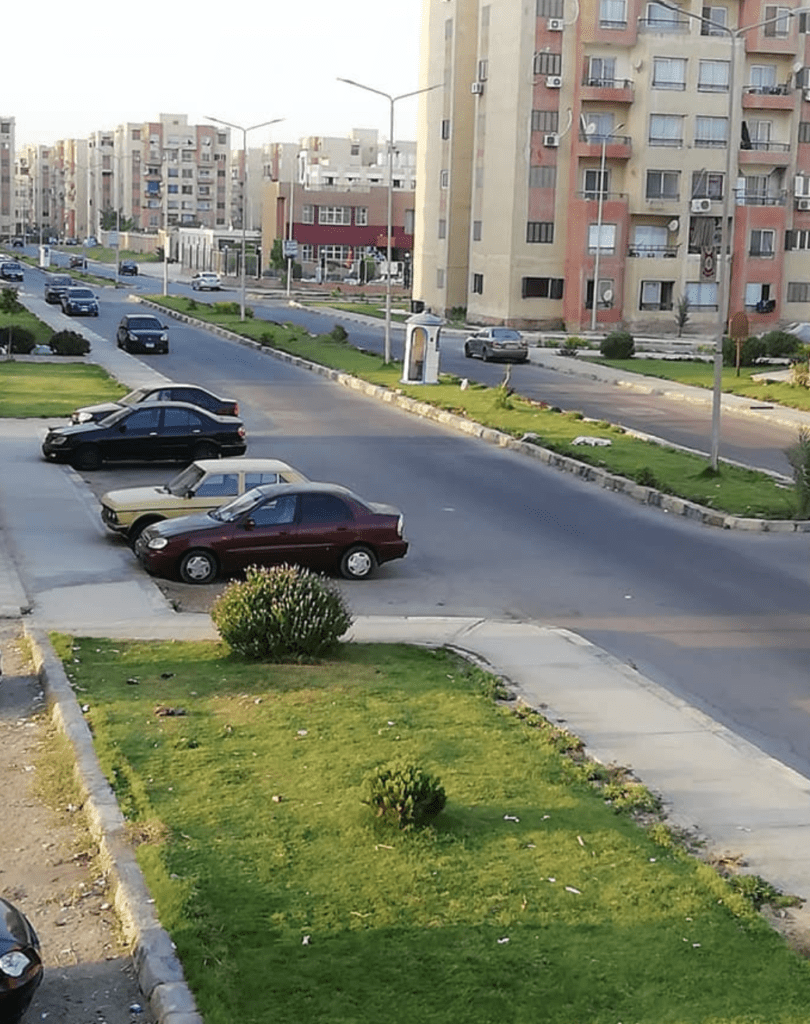In the Pyramids Gardens district, near 6th of October City, you can see the Pyramids from inside “Al-Fardous City” belonging to the Armed Forces. The project has been implemented by The Armed Forces Lands’ Projects Authority to provide housing units for major-generals and officers who work for the Egyptian military institution.
It’s a city with garden spaces, kids and sports areas, allocated to the people who are serving in the army -not the recruits of course- but Major-Generals and other high-ranking officers with their families. There is security, regulations and continuous inspection of the visitors coming to the “Al-Fardous” compound.

The establishment of the Army’s “Fardous” – meaning paradise- near the Pyramids, compels you to think about the accidental symbolism that reflects the desire of offering military officers special appreciation gestures, as if they were an extension of their ancient Egyptian militant ancestors, whose tombs are next to the Pyramids. It is ironic that the Army’s paradise got close to being described as a grave, or a funeral city, especially after Ramadan 2020, when its inhabitants woke up to two murders within only ten days. The victims were two wives who were killed as a result of domestic violence.
Nancy (32 years) left the Army’s paradise in a coffin, bleeding heavily after her husband stabbed her 12 times in front of her two little daughters. This happened after a heated dispute and beating, until the husband picked a knife from the kitchen to tear her body. One of the neighbors told “Daraj”: “Before Sahur time [the prayer time after which those fasting during Ramadan have their last meal] I heard loud screaming. My husband and I rushed to the balcony where we heard a woman’s voice screaming for help, then the voice faded away and there was silence again. We knew then that our neighbor Nancy was murdered by her husband. Her voice has not left my memory. Surprisingly, the compound’s security guards didn’t intervene. Only one neighbor attempted to prevent the husband from running away, but he was also stabbed in the stomach and taken to intensive care.” she said.
“After the killer was brought before the prosecution, we heard that, concerning the reasons that drove him to kill his wife, he said that he doubted her infidelity, which is the expected defense in almost all the domestic killing crimes, as the law commutes the sentence of the husband. He may get acquitted if the case was labeled as a defense of honor.” S.H. added.
Such cities are isolated from the rest of Egyptian society that is stigmatized―from their point of view―by being violent and chaotic, but what is kept hidden inside these cities, makes all the attempts to protect them from the outside world so ironic.
H.A., one of the inhabitants of the compound, said: ”Everybody here knows that Nancy was a “helpful woman”. She earned a living by taking our children to the nursery every day to help her husband with the family’s expenses. We entrusted our kids with her and we trusted her. She was a hard-working disciplined woman. After the Coronavirus crisis, she had lost this income, then her husband got mad because of his need for more money after his wife’s income was cut, so he started treating her harshly and beating her until he killed her.”
“We didn’t expect that he may accuse her of infidelity before the prosecution to get away with his crime after years of her support,” the neighbor added, “he didn’t even think about the fate of his two daughters who lost their mother, and went on to tarnish their reputation. Nancy worked hard to help her husband, seeking a stable life for her family. A dispute between them before Sahur time ended with her murder in front of her six-year-old daughter. Nancy is a tragic story that upset all of October city’s inhabitants. Her husband told lies about her to turn the case into a defense of an honor crime, to commute the sentence because of doubts. She was the pillar of a stable house, but he killed her in the end.”
Nancy’s two daughters moved in with their grandmother, but what happened a week after their mom’s murder completed the tragedy. The husband tried to commit suicide inside the prison, and after being transferred to the hospital, he passed away. We asked the neighbor: “Did her husband work in the Armed Forces?” He replied: “No. Major-generals rent these apartments to citizens, but after following a careful investigation.Such apartments are usually sold only to those working in the Armed Forces. Sometimes, they’re sold to engineers and doctors, but they are prohibited to be sold to journalists, although they are highly demanded by journalists, due to the compound’s proximity to Egyptian Media Production City. After the ‘Coronavirus’ crisis, we demanded that the administration reduce rents for people who are not working in the Armed Forces, but the apartments’ owners refused. Overall, there was an increase in rents, which made many tenants lose control, and family conflicts occurred because of the financial distress.”


Another Tragedy
Less than ten days after Nancy’s murder, the city witnessed another horrible incident. After Iftar time, the neighbors heard voices inside one of the buildings and afterwards, a woman fell dead―from the fifth floor―in front of her building. The prosecutor’s investigations revealed that the victim had committed suicide and that she was not murdered. However, the investigations did not deny that the victim was fighting with her husband, then she threw herself off the balcony to end her life.
It is noteworthy that the truth behind these incidents went unreported in the Egyptian media. Maybe because the incidents of domestic killings became something common, and maybe because the two incidents occurred inside “Al-Fardous” Compound that belongs to the Armed Forces. Even speaking to the residents of “Al-Fardous” city was difficult and required caution. And in an attempt to know what’s happening, on a daily basis, inside that compound, I joined a group of its residents. First, I asked for witnesses to the incident or the numbers of the victims’ relatives for a press report, but I received many messages of harassment, insults and threats to notify the Armed Forces and the National Security, arguing that I wanted to offend “Al-Fardous” city. But when I ignored these messages and started checking the group daily, I recognized that there are some residents who share posts, daily, to inform the security forces against one another. Moreover, some of those living in the compound monitor their neighbors’ “Facebook” accounts. There was a post that caught my eye; screenshot of a conversation with one of the residents who wrote a negative review regarding “The Choice” series, that glorifies the Armed Forces.
The post went viral and many called for arresting the person who expressed such an unacceptable view, in addition to not dealing with him and reporting him to the city’s administration and the major-generals in charge. In effect, the following day, a post was shared about the arrest of this person (one of the compound’s residents), who works as a teacher, accusing him of joining the Muslim Brotherhood.
With the army’s increasing influence, presence and interference―in the Egyptian life― on the security, political, social, economic and even arts levels, the close social footnote and beneficiaries of the army seem to be practicing various precautionary measures to eliminate and keep out the offenders. It is just kind of ironic that this security approach, which is keen on excluding whoever criticizes the army or violates its policy, is never keen on prosecuting domestic violence offences that have repeatedly led to murder.
“Al-Fardous” residential compound reminds us of those new cities which are built in the form of isolated compounds, accompanied with propaganda and some sparkling names for a perfect life and healthy, crime-free community. Such cities are isolated from the rest of Egyptian society that is stigmatized―from their point of view―by being violent and chaotic, but what is kept hidden inside these cities, makes all the attempts to protect them from the outside world so ironic.






